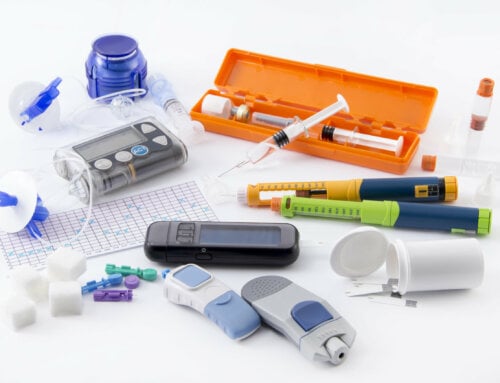Diabetes is well known to have an affect on the nerve endings in our body as well as the blood vessels. Most times, we think of these complications targeting our feet as in neuropathy, our eyes as in retinopathy or in our kidneys as nephropathy. It is documented that people with diabetes also can experience urological and sexual health complications.
Men and women with diabetes can develop sexual health issues because of damage to small blood vessels and nerves. People who keep their blood sugars under control can reduce the chance of developing sexual problems and urologic problems.
When blood sugars are not under control, autonomic nerves can be damaged. Autonomic nerves, which regulate internal organs, can be damaged due to an excess of blood sugar. Eventually, this can increase risk and cause dysfunction to multiple organs involved in our sexual response. Some of the risk factors which can increase sexual and urological problems may include:
- Smoking
- Obesity
- Age-over 40
- Sedentary lifestyle
- Hypertension
- Uncontrolled glucose levels
- Elevated levels of LDL cholesterol
- Depression
- Anxiety/stress/fatigue
- Poor communication/low self esteem/fear of sexual failure
- Alcohol
- Medications
- Lack of testosterone
- Menopause
- Pregnancy
The Most Common Sexual Issues for Men Include:
Erectile Dysfunction
Men with diabetes may experience erectile dysfunction. This is a consistent inability to develop a firm erection for sexual intercourse. It is 2-3 times more prevalent in men with diabetes than men who do not have diabetes. Additional causes of erectile dysfunction include blood vessel disease, kidney disease, high blood pressure and alcohol abuse. Neuropathy, or nerve damage can also be a cause of erectile dysfunction.
Treatment options include certain oral medications such as Viagra, Cialis, or Levitra. Other options could include suppositories inserted into the penis, vacuum devices or penile implants. Check with your physician to know which is best for you.
Retrograde Ejaculation:
Another sexual health issue for men with diabetes is retrograde ejaculation. All or part of the man’s semen goes into the bladder rather than out of the penis when ejaculating. It is caused by a sphincter problem; it is more common with men who have diabetes. Poor blood glucose control and nerve damage can lead to retrograde ejaculation. Other causes include certain medications and prostate surgery.
It is important to maintain healthy blood sugar levels and consult with your doctor about ongoing highs or lows. A medication that strengthens the muscle tone of the sphincter may help men with retrograde ejaculation. When it comes to fertility, an urologist who specializes in infertility treatments can help promote fertility through methods such as collecting the sperm for artificial insemination.
Bladder Conditions:
Nerves that are damaged can cause overactive bladders or urine retention. Treatment for this situation can include inserting a catheter as specific times to retrain the bladder or urinating at specific times. Oral medications as well as surgery may be another option. Check with your physician.
The most common issues for Women include:

Sexual issues can also be linked with smoking, gynecologic infections, menopause, pregnancy and psychological problems such as depression or anxiety. Treatments may include vaginal lubricants for vaginal dryness; psychological counseling for emotional issues and Kegel exercises to strengthen the pelvic muscles and help improve sexual response. Researchers are currently studying potential drug treatments.
Decreased Lubrication:
Decreased lubrication can be helped by over the counter lubricants or prescription lubricants. Other options include prescription hormone suppositories. You should consider other ways to share intimacy until this is resolved.
Decreased Desire:
Decreased desire or lack of sexual response can be helped with counseling either alone or as a couple. Kegel exercises or exercises that strengthen the pelvic floor muscles can have a positive affect on the sexual response.
Yeast Infections:
Yeast loves sugar and multiplies when the blood sugar is out of control. Symptoms include burning, itching and discharge. Having blood sugar control and eating yogurt such as Greek yogurt can help. When you have an infection talk to your physician about treatment options.
Urinary Tract Infections:
Women and men with diabetes tend to get more infections including U.T.I.s. Symptoms can include pain, urgency, and frequency. Blood in the urine with fever, nausea, chills and back pain can occur, but more likely is a kidney infection. Antibiotics are necessary for these conditions along with anti-spasmodic medication to help bladder spasms.
Urologic Problems and Diabetes
Urologic problems linked with diabetes may also cause sexual health issues. Bladder problems can be caused by damage to the nerves that control the bladder functions. Men and women may experience an overactive bladder. A person may have a sudden, strong urge to urinate and have leakage of urine. This is referred to as incontinence.
Other bladder problems include poor control of the sphincter muscles that leads to leakage. Urine retention may occur when nerve damage keeps the bladder muscles from getting the message that it is time to urinate. The muscles might be too weak to fully empty the bladder. The bladder could back up and become too full, leading to an infection in the bladder or kidneys. To detect if a person has bladder problems, tests such as a cystoscopy, urodynamic testing and x-rays may be done. Medications could be prescribed for urine retention. A catheter might need to be used to help drain the urine. Other potential treatments include surgery, timed voiding, medications and Kegel exercises.
What Causes Urinary Tract Infections?
Urinary tract infections occur when bacteria reach the urinary tract. Bacteria growing in the urethra are called urethritis. If this bacteria travels up the urinary tract, it can lead to a bladder infection called cystitis. An untreated infection can lead to a kidney infection and related sexual health issues. Symptoms of a urinary tract infection include cloudy urine, an urge to urinate frequently and burning during urination. Men may feel fullness in the rectum and women could have a feeling of pressure over the pubic bone. If a person feels pain in the back or side, gets a fever and becomes nauseous, this could indicate a kidney infection. The doctor will take a urine sample to analyze. Other tests that might be done include an ultrasound exam, cystoscopy and an intravenous pyelogram. It is important to detect a urinary tract infection early to avoid more serious health issues. Often an antibiotic treatment is prescribed and the patient is advised to drink plenty of water.
People with diabetes can help prevent sexual and urologic problems by keeping their blood sugar, blood pressure and cholesterol levels close to the target number. Smokers should quit immediately due to increased nerve damage. It is important for people with diabetes to have an effective self-management plan to reduce the possibility of developing sexual health problems. If you do have sexual health issues, communicate your problems with your physician immediately to get the treatment you need. It also helps to maintain a healthy weight and be physically active.







Leave A Comment